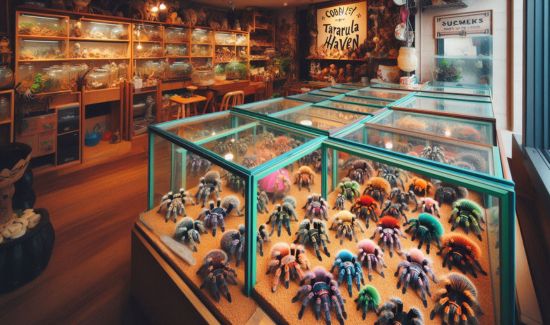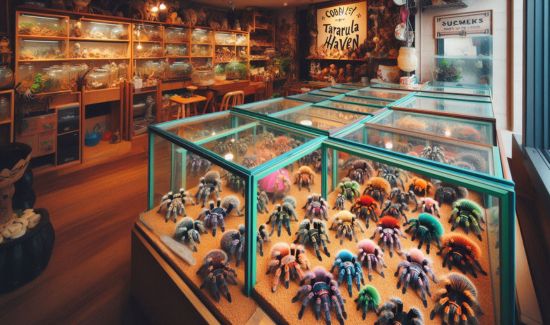Introduction
Table of Contents
Are you thinking of adding a tarantula to your family of pets? These fascinating creatures are known for their unique behavior, stunning appearance, and low maintenance. But before you decide to bring one home, you need to know where to find a tarantula for sale near you and what to consider when choosing one. This article will guide you through the process of finding the best tarantula and provide you with all the essential information to ensure your new pet is healthy and well-cared for. Whether you’re a first-time buyer or an experienced arachnid enthusiast, this guide is designed to help you make an informed decision.
Why Choose a Tarantula as a Pet?
1. Low Maintenance
Tarantulas are relatively low-maintenance pets compared to cats or dogs. They don’t need daily walks, and their feeding schedule is much more flexible. A tarantula can go days or even weeks without food, making them a perfect pet for people with busy schedules.
2. Fascinating Behavior
Tarantulas are known for their unique and mesmerizing behavior. Watching them hunt, molt, and spin webs can be both educational and entertaining. Their behavior varies depending on the species, which adds to the excitement of owning one.
3. Affordable
Owning a tarantula is relatively affordable compared to other exotic pets. The initial purchase cost is reasonable, and their upkeep, including food and habitat, is inexpensive. This makes them a great option for those looking for a budget-friendly pet.
Where to Find Tarantula for Sale Near Me?
1. Local Pet Stores
Local pet stores often carry tarantula for sale near me. However, their selection may be limited, and the species available may not always be the most exotic. When buying from a local store, ensure that the tarantula is healthy, and ask the staff about its care requirements.

Pros:
- Easy to find
- Staff assistance available
Cons:
- Limited species variety
- Potentially higher prices
2. Reptile and Exotic Pet Expos
Reptile and exotic pet expos are excellent places to find a variety of tarantulas. These events gather breeders and enthusiasts, offering a wider selection of species. Additionally, you can meet experienced breeders who can provide valuable advice on caring for your new tarantula.
Pros:
- Wide variety of species
- Expert advice available
Cons:
- May not be available year-round
- Travel might be required
3. Online Breeders
If you’re looking for a specific species, purchasing a tarantula online from a reputable breeder might be the best option for finding tarantula for sale near me. Online breeders often have a larger selection of tarantulas and can ship them directly to your home. Ensure that the breeder is reputable by reading reviews and checking for proper certifications.
Pros:
- Access to rare species
- Convenient shopping experience
Cons:
- Risk of scams or unhealthy tarantulas
- Additional shipping costs
4. Exotic Pet Shops
Specialized exotic pet shops are another option for finding tarantula for sale near me. These stores focus on exotic pets and are more likely to carry a diverse range of tarantula species. The staff at these shops are often knowledgeable and can provide in-depth care instructions.
Pros:
- Diverse selection of species
- Expert staff
Cons:
- May be more expensive
- Limited locations
5. Local Breeders
Purchasing from a local breeder can be a great way to ensure you’re getting a healthy tarantula. Local breeders often have a deep understanding of the species they breed and can provide you with personalized care advice. Additionally, you can see the conditions in which the tarantulas are raised.
Pros:
- Assurance of quality and health
- Personalized care advice
Cons:
- May require some research to find
- Limited availability
What to Look for When Buying a Tarantula
1. Species Selection
Different tarantula species have varying care requirements, temperaments, and appearances. Some are more docile, while others are more defensive. Consider what type of tarantula fits your lifestyle and experience level. Popular species for beginners include the Chilean Rose Hair and Mexican Redknee Tarantula.
2. Health Indicators
Before purchasing, inspect the tarantula for any signs of illness or distress. Look for a clean, intact exoskeleton, and make sure the tarantula is active and alert. Avoid tarantulas that appear lethargic or have visible deformities.
3. Age and Size
Consider the age and size of the tarantula you’re purchasing. Younger tarantulas require more care and may be more delicate. On the other hand, adult tarantulas are generally easier to care for but may have a shorter lifespan.
4. Gender
In some species, female tarantulas tend to live longer than males. If you’re looking for a long-term pet, consider purchasing a female. However, be aware that determining the gender of a tarantula can be challenging without professional assistance.
5. Housing Requirements
Ensure you have the proper habitat ready before bringing your tarantula home. Different species have different housing needs, such as specific humidity levels, temperature ranges, and space requirements. Research the specific needs of your chosen tarantula species to provide them with a comfortable environment.
Caring for Your New Tarantula
1. Habitat Setup
Setting up a proper habitat for your tarantula is crucial for its well-being. You’ll need a suitable enclosure, substrate, hiding spots, and a water dish. The enclosure should be escape-proof and provide enough space for your tarantula to move around comfortably.
2. Feeding
Tarantulas are carnivores and primarily eat insects such as crickets, mealworms, and roaches. Feeding frequency depends on the species and age of your tarantula. Young tarantulas may need to be fed more often, while adults can go longer between meals.
3. Molting
Tarantulas molt as they grow, shedding their old exoskeleton and forming a new one. This process is natural, but it can be stressful for the tarantula. During molting, avoid handling your pet and make sure the habitat is clean and secure.
4. Handling and Interaction
While tarantulas are generally low-maintenance pets, they are not known for being particularly affectionate. Most tarantulas prefer not to be handled, and frequent handling can cause stress. If you do decide to handle your tarantula, make sure to do so gently and only when necessary.
Table of Information: Tarantula for Sale Near Me
| Species | Temperament | Lifespan | Size | Ideal for Beginners? |
|---|---|---|---|---|
| Chilean Rose Hair | Docile | 15-20 years | 5-6 inches | Yes |
| Mexican Redknee Tarantula | Calm | 20-25 years | 5-6 inches | Yes |
| Cobalt Blue Tarantula | Defensive | 10-15 years | 4-5 inches | No |
| Green Bottle Blue Tarantula | Moderate | 10-15 years | 5-6 inches | Yes |
| Goliath Bird-Eater Tarantula | Aggressive | 15-20 years | 10-12 inches | No |
FAQs About Tarantula For Sale Near You
1. Where can I find tarantula for sale near me?
You can find tarantulas for sale at local pet stores, reptile expos, online breeders, exotic pet shops, and through local breeders.
2. What should I look for when buying a tarantula?
Look for a healthy tarantula with a clean exoskeleton, active behavior, and ensure the species matches your experience level.
3. How much does a tarantula cost?
The cost of a tarantula can vary depending on the species, ranging from $20 to over $100.
4. Can I handle my tarantula?
While handling is possible, it’s generally best to avoid frequent handling as it can stress the tarantula.
5. What do tarantulas eat?
Tarantulas primarily eat insects such as crickets, mealworms, and roaches.
